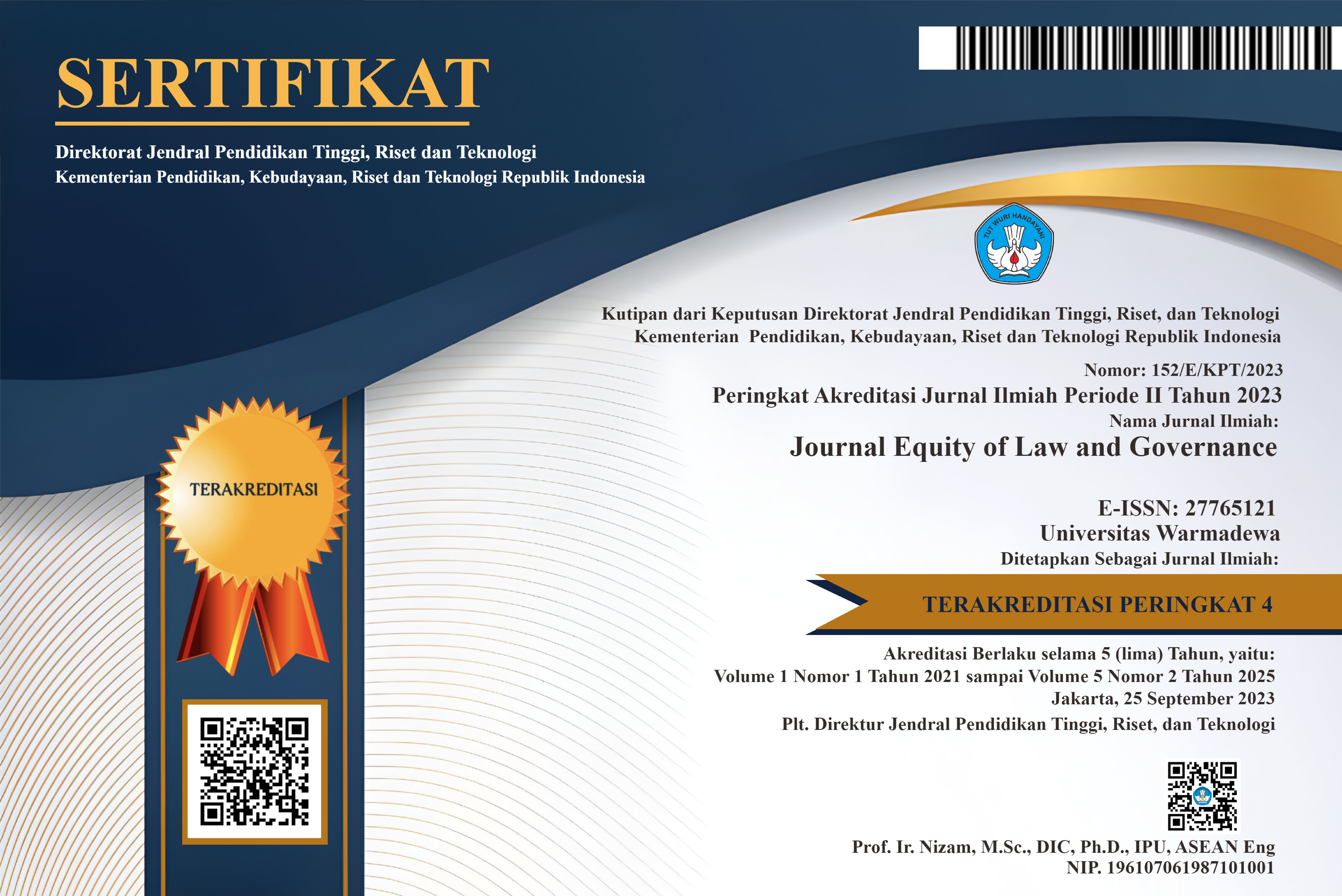Constitutional Law Reform: Analysis and Impact
Abstract
This research aims to assess the efficacy of the amendments to the 1945 Constitution of the Unitary State of the Republic of Indonesia in promoting democratic values and enhancing government accountability. Utilizing a normative research method, the study involves comprehensive literature reviews and detailed analyses of legal documents, including related laws, regulations, official documents, academic publications, and specific amendments to the Constitution. These amendments, which included limiting the presidential term, increasing the transparency of the general election process, and strengthening the roles of the People's Representative Council and the Regional Representative Council, were evaluated for their impact. The findings indicate that while the constitutional changes have fostered increased accountability and transparency within the government, challenges such as bureaucratic inertia, public ignorance of legal frameworks, and persistent corruption continue to impede full realization of the reforms. The study suggests that enhanced public engagement, stricter law enforcement, and further bureaucratic reform are necessary to overcome these obstacles. Successfully addressing these challenges could lead to a smoother functioning of governance, improved administration, and the establishment of a democratic and just legal state that aligns with Indonesia's aspirations. The potential implications of these reforms are significant, promising to enhance the democratic fabric and accountability mechanisms of the country.
References
Abqa, M. A. R., Junaidi, Hutabarat, S. A., Suhariyanto, D., Fauziah, N. M., Khilmi, E. F., Meliana, Y., & Muhtar, M. H. (2023). Hukum Tata Negara: Sebuah Konsep Dasar Dalam Menata Bangsa. Pt. Sonpedia Publishing Indonesia.
Agustina, E., Irvita, M., Saharuddin, S., Rahim, E. I., & Muhtar, M. H. (2024). Finding A New Direction For Indonesian Democracy: Analysis Of Limitations Of The President’s Powers In The Amendments To The Constitution. Legal Brief, 13(1), Article 1. Https://Doi.Org/10.35335/Legal.V13i1.929
Al, M. H. M. Et. (2023). Human Rights Constitution On Health Protection Of Indonesian Citizens. Russian Law Journal, 11(2), Article 2. Https://Doi.Org/10.52783/Rlj.V11i2.520
Amer, N., Lubis, A. F., Muhtar, M. H., Saija, V. J. E., Putri, V. S., & Setiawan, B. (2024). Implications Of The Constitution For Political Neutrality In The Dynamics Of Law And Democracy. Journal De Facto, 10(2), Article 2. Https://Doi.Org/10.36277/Jurnaldefacto.V10i2.189
Amiruddin & Asikin, Z. (2012). Pengantar Metode Penelitian Hukum. Raja Grafindo Persada.
Asep Bambang Hermanto, -, & Bambang Slamet Riyadi, -. (2020). Constitutional Law On The Discretionary Of Prosecutor’s Power Against Abuse Of Power Implications Of Corruption Culture In The Prosecutor’s Office Republic Of Indonesia. International Journal Of Criminology And Sociology, 9, 763–772.
Asshiddiqie, J. (2009). Green Constitution: Nuansa Hijau Undang-Undang Dasar Negara Republik Indonesia Tahun 1945. Rajawali Pers. Https://Cir.Nii.Ac.Jp/Crid/1130000793942369024
Bourchier, D. M. (2019). Two Decades Of Ideological Contestation In Indonesia: From Democratic Cosmopolitanism To Religious Nationalism. Journal Of Contemporary Asia, 49(5), 713–733. Https://Doi.Org/10.1080/00472336.2019.1590620
Cammack, M., Bedner, A., & Van Huis, S. (2015). Democracy, Human Rights, And Islamic Family Law In Post-Soeharto Indonesia (Ssrn Scholarly Paper 2567571). Https://Papers.Ssrn.Com/Abstract=2567571
Davidson, J. S. (2010). Dilemmas Of Democratic Consolidation In Indonesia. Dalam Contemporary Authoritarianism In Southeast Asia. Routledge.
Diharjo, N. N., Muhtar, M. H., Rahim, E. I., Rachman, S. N., Saija, V. J. E., & Lubis, A. F. (2024). Human Rights And Constitutional Sovereignty In The Context Of The Struggle For Legal Justice. Bacarita Law Journal, 4(2), Article 2. Https://Doi.Org/10.30598/Bacarita.V4i2.12985
Harahap, T. K., Prayuti, Y., Latianingsih, N., Damanik, A., Maheni, T., Farida, I., Muhtar, M. H., & Mustaqim. (2023). Pengantar Ilmu Hukum. Penerbit Tahta Media. Https://Tahtamedia.Co.Id/Index.Php/Issj/Article/View/255
Hendrianto, S. (2018). Law And Politics Of Constitutional Courts: Indonesia And The Search For Judicial Heroes. Routledge. Https://Doi.Org/10.4324/9781315100043
Maria Farida Indrati Soeprapto. (1998). Ilmu Perundang-Undangan. Kanisius.
Muhtar, M. H. (2019). Model Politik Hukum Pemberantasan Korupsi Di Indonesia Dalam Rangka Harmonisasi Lembaga Penegak Hukum. Jambura Law Review, 1(1), Article 1. Https://Doi.Org/10.33756/Jalrev.V1i1.1988
Muhtar, M. H., Maranjaya, A. K., Arfiani, N., & Rahim, E. (2023). Teori & Hukum Konstitusi: Dasar Pengetahuan Dan Pemahaman Serta Wawasan Pemberlakuan Hukum Konstitusi Di Indonesia. Pt. Sonpedia Publishing Indonesia. Https://Books.Google.Com/Books?Hl=En&Lr=&Id=T2hleaaaqbaj&Oi=Fnd&Pg=Pa76&Dq=Teori+%26+Hukum+Konstitusi:+Dasar+Pengetahuan+Dan+Pemahaman+Serta+Wawasan+Pemberlakuan+Hukum+Konstitusi+Di+Indonesia&Ots=Otvcjosume&Sig=Wbp8tb0xvaput2kifks80ojgtse
Muhtar, M. H., Tribakti, I., Salim, A., Tuhumury, H. A., Ubaidillah, M. H., Imran, S. Y., Laka, I., Saragih, G. M., Iping, B., & Amin, F. (2023). Konsep Hukum Indonesia. Global Eksekutif Teknologi. Https://Www.Researchgate.Net/Profile/Mohamad-Hidayat-Muhtar/Publication/370583612_Sejarah_Tata_Hukum_Indonesia/Links/64573db95762c95ac378e471/Sejarah-Tata-Hukum-Indonesia.Pdf
Pujayanti, L. P. V. A., Nugrahayu, Z. Z., Rahim, E. I., Muhtar, M. H., & Yassine, C. (2024). Indonesia’s Constitutional Court: Bastion Of Law Enforcement And Protector Of Human Rights In The Reform Era. Jurnal Pamator?: Jurnal Ilmiah Universitas Trunojoyo, 17(1), Article 1. Https://Doi.Org/10.21107/Pamator.V17i1.24128
Razak, A., Muhtar, M. H., Rivera, K. M., & Saragih, G. M. (2023). Balancing Civil And Political Rights: Constitutional Court Powers In Indonesia And Austria. Journal Of Indonesian Legal Studies, 8(2), Article 2. Https://Doi.Org/10.15294/Jils.V8i2.70717
Suwito, Setiyawan, D., Muhtar, M. H., & Ahmad. (2023). Contemplating The Morality Of Law Enforcement In Indonesia. Journal Of Law And Sustainable Development, 11(10), E1261–E1261. Https://Doi.Org/10.55908/Sdgs.V11i10.1261
Taufiqurrohman, A. A., Muhtar, M. H., Ahmad, A., Kasim, N. M., & Imran, S. Y. (2024). The Role Of Islamic Law, Constitution, And Culture In Democracy In The Uae And Indonesia. Ahkam: Jurnal Ilmu Syariah, 24(1).
Yudhanegara, F., Arifuddin, Q., Muhtar, M. H., Yani, M. A., Amalia, M., Judijanto, L., & Hr, M. A. (2024). Pengantar Filsafat Hukum: Sebuah Ontologi, Epistemologi, Dan Aksiologi Ilmu Hukum. Pt. Sonpedia Publishing Indonesia.
 Abstract viewed = 55 times
Abstract viewed = 55 times
 pdf downloaded = 30 times
pdf downloaded = 30 times













